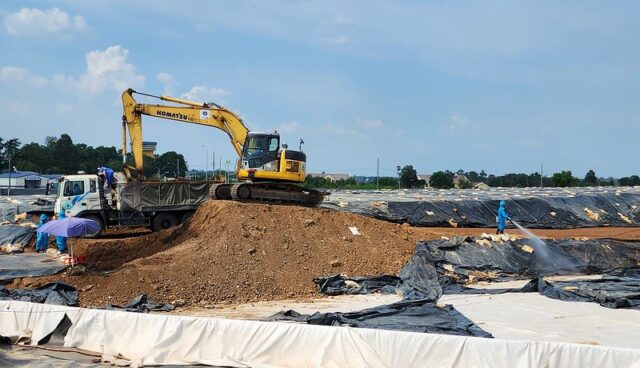Credit:
Richard Nyberg, USAID
Another significant area of concern is the heavily contaminated Biên Hoà airbase, where residents are still exposed to elevated levels of dioxin through local wildlife, including fish, chickens, and ducks.
Agent Orange drums used at the airbase leaked toxins into the soil and water, leading to bioaccumulation in animals higher up the food chain. While remediation efforts commenced in 2019, there are uncertainties regarding their continuity due to cuts in USAID funding proposed by the Trump administration, leaving the presence of American experts in Vietnam uncertain.
Laws to prevent future ‘ecocide’ are complicated
Although the health impacts of Agent Orange have garnered significant attention, the ecological repercussions remain understudied.
Modern scientists have access to advanced tools, including satellite imagery, which is currently being utilized in Ukraine to monitor environmental disasters such as fires and flooding. Nonetheless, these technologies cannot substitute for direct on-the-ground assessments, which are often risky or limited in conflict zones.
The legal landscape surrounding environmental protection during wartime is complex.
In 1977, the Geneva Conventions were revised to prohibit “widespread, long term, and severe damage to the natural environment.” Additionally, an 1980 protocol imposed restrictions on incendiary weapons. Yet incidents such as the oil well fires ignited by Iraq during the Gulf War and the environmental devastation in Gaza, Ukraine, and Syria have demonstrated the inadequacies of relying solely on treaties without robust compliance mechanisms.

Credit:
USAID Vietnam
An ongoing international initiative advocates for an amendment to the Rome Statute of the International Criminal Court that would classify ecocide as a fifth prosecutable offense, alongside genocide, crimes against humanity, war crimes, and aggression.
Some nations have enacted their own ecocide legislations. Vietnam stands out as the first to explicitly define in its penal code that “Ecocide, destroying the natural environment, whether committed in time of peace or war, constitutes a crime against humanity.” However, this law has yet to lead to any prosecutions, despite numerous significant pollution incidents.
Both Russia and Ukraine have similar laws in place, although these have not effectively curbed environmental harm or held individuals accountable amid the ongoing hostilities.
Lessons for the future
The Vietnam War illustrates that neglecting ecological consequences, both during and post-conflict, can lead to enduring repercussions. The challenge remains to foster the political will necessary to confront and mitigate these impacts decisively.
This article is republished from The Conversation under a Creative Commons license. Read the original article.






